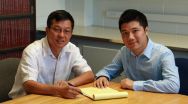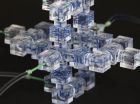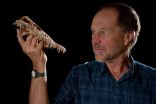(Press-News.org) SALT LAKE CITY, Sept. 22, 2014 – University of Utah engineers discovered a way to create a special material – a metal layer on top of a silicon semiconductor – that could lead to cost-effective, superfast computers that perform lightning-fast calculations but don't overheat.
This new "topological insulator" behaves like an insulator on the inside but conducts electricity on the outside and may pave the way for quantum computers and fast spintronic devices.
The research, led by University of Utah materials science and engineering professor Feng Liu, was published today in the journal Proceedings of the National Academy of Sciences.
Since the discovery of topological insulators almost a decade ago as a class of material designed to speed up computers, scientists have been trying to create a topological insulator that creates a large energy gap.
An energy gap is the amount of energy it takes for electrons to conduct electricity in a given material. A larger gap allows electricity to be conducted on a material's surface so a computer can operate at room temperature while remaining stable. Liu and his team found that bismuth metal deposited on the silicon can result in a more stable large-gap topological insulator. But just as important, this process can be cost-effective and readily integrated with current widespread silicon semiconductor manufacturing techniques.
"We can put it on silicon so it can be married or combined with the existing semiconductor technology," Liu says. "This is very important. It makes it more experimentally feasible and practically realistic."
Because the bismuth layer is atomically bonded but electronically isolated from the silicon layer, it creates a large energy gap.
"It has the largest energy gap that was ever predicted. It makes room-temperature applications a possibility for topological insulator-based devices or computers," Liu says.
Quantum computers, which have not been built yet, would run on the principles of quantum mechanics, in which the smallest particles of light and matter can be in different places at the same time. Quantum computers theoretically could be billions of times faster than conventional computers.
Quantum computing is expected to be used in a variety of uses, including in big data centers, security systems and encryption.
Spintronics is a new technology that uses the spin of an electron (instead of charge) in electronic devices. Spin is a property of electrons that makes the electron act like a tiny magnet. Spintronic devices can be used to encode and transfer information in electronic circuits and computers.
INFORMATION:
Liu's study was funded primarily by the U.S. Department of Energy and partly by the National Science Foundation through the University of Utah's Materials Research Science and Engineering Center.
Liu conducted the research with materials science and engineering postdoctoral fellows Miao Zhou, Zheng Liu, and Zhengfei Wang, and doctoral student Wenmei Ming.
University of Utah College of Engineering
72 S. Central Campus Dr., Room 1650 WEB, Salt Lake City, UT 84112
801-581-6911 fax: 801-581-8692
coe.utah.edu
University of Utah engineers unlock potential for faster computing
New 'topological insulator' could lead to superfast computers
2014-09-22
ELSE PRESS RELEASES FROM THIS DATE:
Lego-like modular components make building 3-D 'labs-on-a-chip' a snap
2014-09-22
Thanks to new LEGO®-like components developed by researchers at the USC Viterbi School of Engineering, it is now possible to build a 3-D microfluidic system quickly and cheaply by simply snapping together small modules by hand.
Microfluidic systems are used in many fields including engineering, chemistry and biotechnology to precisely manipulate small volumes of fluids for use in applications such as enzymatic or DNA analysis, pathogen detection, clinical diagnostic testing, and synthetic chemistry. Traditionally, microfluidic devices are built in a cleanroom on a two-dimensional ...
Platelets modulate clotting behavior by 'feeling' their surroundings
2014-09-22
Platelets, the tiny cell fragments whose job it is to stop bleeding, are very simple. They don't have a cell nucleus. But they can "feel" the physical environment around them, researchers at Emory and Georgia Tech have discovered.
Platelets respond to surfaces with greater stiffness by increasing their stickiness, the degree to which they "turn on" other platelets and other components of the clotting system, the researchers found.
"Platelets are smarter than we give them credit for, in that they are able to sense the physical characteristics of their environment and ...
Genetic switch regulates a plant's internal clock based on temperature
2014-09-22
Scientists have discovered a key molecular cog in a plant's biological clock – one that modulates the speed of circadian (daily) rhythms based on temperature.
Transcription factors, or genetic switches, drive gene expression in plants based on external stresses – such as light, rain, soil quality, or even animals grazing on them. A team of researchers at USC has isolated one, called FBH1, that reacts to temperature – tweaking the rhythm here and there as needed while in keeping it on a consistent track.
"Temperature helps keep the hands of the biological clock in the ...
Massachusetts General study reveals gene expression patterns in pancreatic CTCs
2014-09-22
Analysis of circulating tumor cells (CTCs) in a mouse model of pancreatic cancer identified distinct patterns of gene expression in several groups of CTCs, including significant differences from the primary tumor that may contribute to the ability to generate metastases. In their study reported in the Sept. 25 issue of Cell Reports, investigators from the Massachusetts General Hospital (MGH) Cancer Center identified several different classes of pancreatic CTCs and found unexpected factors that may prove to be targets for improved treatment of the deadly tumor.
"Our ...
Infant solar system shows signs of windy weather
2014-09-22
Astronomers using the Atacama Large Millimeter/submillimeter Array (ALMA) have observed what may be the first-ever signs of windy weather around a T Tauri star, an infant analog of our own Sun. This may help explain why some T Tauri stars have disks that glow weirdly in infrared light while others shine in a more expected fashion.
T Tauri stars are the infant versions of stars like our Sun. They are relatively normal, medium-size stars that are surrounded by the raw materials to build both rocky and gaseous planets. Though nearly invisible in optical light, these disks ...
Old drug may be key to new antibiotics
2014-09-22
Hamilton, ON (September 22, 2014) – McMaster scientists have found that an anticonvulsant drug may help in developing a new class of antibiotics.
Although dozens of antibiotics target what bacteria do, their study has looked at how a certain part of bacteria are created, and they found there is a way of stopping it.
The discovery is important as there is growing concern worldwide about how antibiotic resistance is making the cures for infections ineffective. The World Health Organization has declared that antibiotic resistance is a major threat to global health security. ...
Answer to restoring lost island biodiversity found in fossils
2014-09-22
GAINESVILLE, Fla. --- Many native species have vanished from tropical islands because of human impact, but University of Florida scientists have discovered how fossils can be used to restore lost biodiversity.
The key lies in organic materials found in fossil bones, which contain evidence for how ancient ecosystems functioned, according to a new study available online and in the September issue of the Journal of Herpetology. Pre-human island ecosystems provide vital clues for saving endangered island species and re-establishing native species, said lead author Alex Hastings, ...
Higher risk of heart disease for South Asians in Canada
2014-09-22
Hamilton, ON (September 22, 2014) – South Asians living in Canada have a higher rate of heart disease and double the rate of diabetes compared with while people, McMaster researchers have found.
The paper was published today in the Canadian Medical Association Journal (CMAJ Open) and may be found at http://www.cmajopen.ca/content/2/3/E183.full
One of the fastest-growing ethnic groups in the country is the more than one million South Asian people living in Canada, comprising about three percent of the population. They include people from India, Pakistan, Sri Lanka, ...
Snail shells show high-rise plateau is much lower than it used to be
2014-09-22
The Tibetan Plateau in south-central Asia, because of its size, elevation and impact on climate, is one of the world's greatest geological oddities.
At about 960,000 square miles it covers slightly more land area than Alaska, Texas and California combined, and its elevation is on the same scale as Mount Rainier in the Cascade Range of Washington state. Because it rises so high into the atmosphere, it helps bring monsoons over India and other nations to the south while the plateau itself remains generally arid.
For decades, geologists have debated when and how the plateau ...
Cheater, cheater: UGA study shows what happens when employees feel excluded at work
2014-09-22
Athens, Ga. – When employees feel left out, they act out.
That's the message that new research from the University of Georgia Terry College of Business delivers as it explains why employees can become weasels to benefit their work group.
"Everybody has a need for social approval. It's the basis of our human functioning," said Marie Mitchell, co-author of the research and professor of management at UGA. "But when individuals are faced with a risk of social exclusion, it motivates some pretty unsavory behaviors. We already know how people react when they're definitely ...
LAST 30 PRESS RELEASES:
Novel camel antimicrobial peptides show promise against drug-resistant bacteria
Scientists discover why we know when to stop scratching an itch
A hidden reason inner ear cells die – and what it means for preventing hearing loss
Researchers discover how tuberculosis bacteria use a “stealth” mechanism to evade the immune system
New microscopy technique lets scientists see cells in unprecedented detail and color
Sometimes less is more: Scientists rethink how to pack medicine into tiny delivery capsules
Scientists build low-cost microscope to study living cells in zero gravity
The Biophysical Journal names Denis V. Titov the 2025 Paper of the Year-Early Career Investigator awardee
Scientists show how your body senses cold—and why menthol feels cool
Scientists deliver new molecule for getting DNA into cells
Study reveals insights about brain regions linked to OCD, informing potential treatments
Does ocean saltiness influence El Niño?
2026 Young Investigators: ONR celebrates new talent tackling warfighter challenges
Genetics help explain who gets the ‘telltale tingle’ from music, art and literature
Many Americans misunderstand medical aid in dying laws
Researchers publish landmark infectious disease study in ‘Science’
New NSF award supports innovative role-playing game approach to strengthening research security in academia
Kumar named to ACMA Emerging Leaders Program for 2026
AI language models could transform aquatic environmental risk assessment
New isotope tools reveal hidden pathways reshaping the global nitrogen cycle
Study reveals how antibiotic structure controls removal from water using biochar
Why chronic pain lasts longer in women: Immune cells offer clues
Toxic exposure creates epigenetic disease risk over 20 generations
More time spent on social media linked to steroid use intentions among boys and men
New study suggests a “kick it while it’s down” approach to cancer treatment could improve cure rates
Milken Institute, Ann Theodore Foundation launch new grant to support clinical trial for potential sarcoidosis treatment
New strategies boost effectiveness of CAR-NK therapy against cancer
Study: Adolescent cannabis use linked to doubling risk of psychotic and bipolar disorders
Invisible harms: drug-related deaths spike after hurricanes and tropical storms
Adolescent cannabis use and risk of psychotic, bipolar, depressive, and anxiety disorders
[Press-News.org] University of Utah engineers unlock potential for faster computingNew 'topological insulator' could lead to superfast computers







